Buying a car is a major financial decision, and the timing of your purchase can significantly impact how much you pay. With strategic planning, car buyers can leverage seasonal trends, dealership sales goals, and promotional events to secure the best deals.
For instance, data shows that discounts during peak sales periods, such as November and December, can range from 5-10% off MSRP, while car sales on Black Friday alone increase by 20% compared to regular weekends.
This guide dives into the optimal times of the year to buy a car, highlights the best and worst days to shop, and provides actionable strategies to help you maximize savings. This guide will explore the best time to buy a car throughout the calendar year, helping you confidently navigate the auto industry.

Key Takeaways
- The best times to buy a car include November-December, early fall, and July 4th sales events due to discounts and dealer incentives.
- Avoid buying in January-February or during busy holiday weekends, as prices and inventory may not be as favourable.
- Mondays and Tuesdays are ideal for negotiating deals at less crowded dealerships.
- Research prices, secure pre-approved financing, and leverage manufacturer incentives for optimal savings.
Best Time To Buy A Car -Understanding Key Landscapes
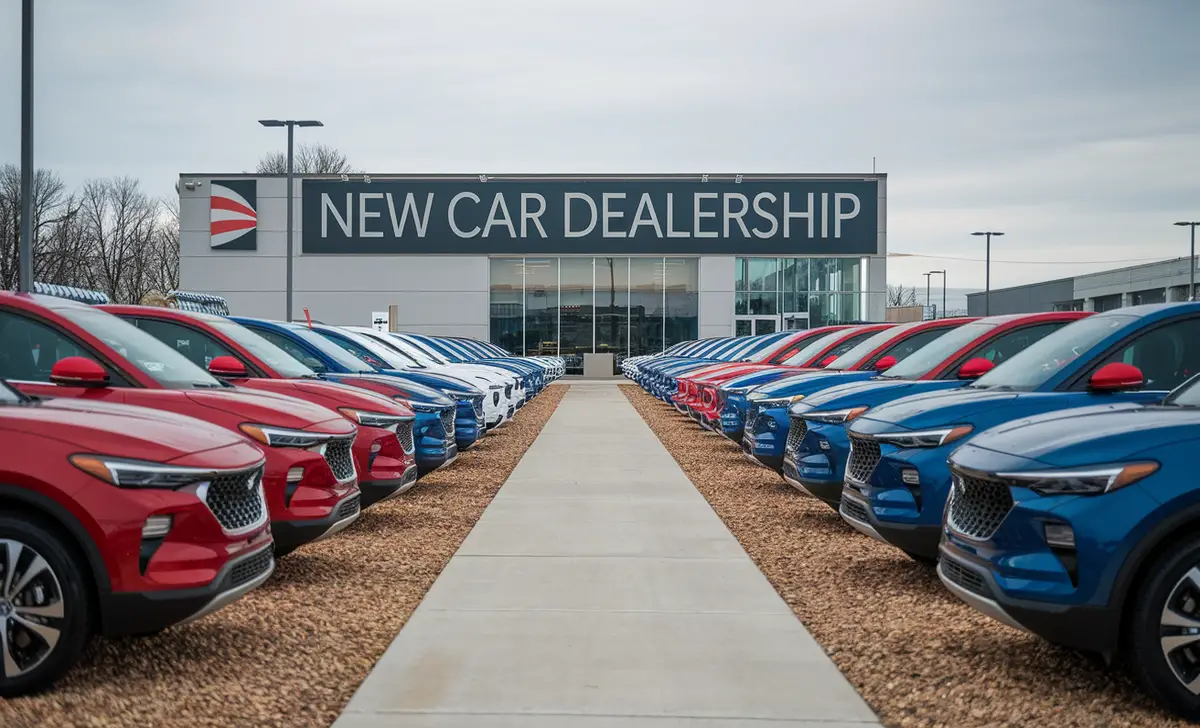
The best time to buy a car can depend on various factors such as price discounts, inventory, and seasonal trends. The year’s final month often has the deepest discounts, especially as dealerships want to clear out current-year models to make space for new inventory.
Key Seasonal Insights
- Best Time Overall:
- November to December for maximum discounts and incentives.
- Best for Variety:
- Spring and early summer, when inventory is at its peak.
- Best for Outgoing Models:
- September to October, during the model-year transition.
Car prices fluctuate throughout the year due to various factors, including seasonal trends, dealership sales goals, and new model releases. Awareness of these trends can assist car buyers in timing their purchases for optimal savings.
1. End Of The Year (November And December)
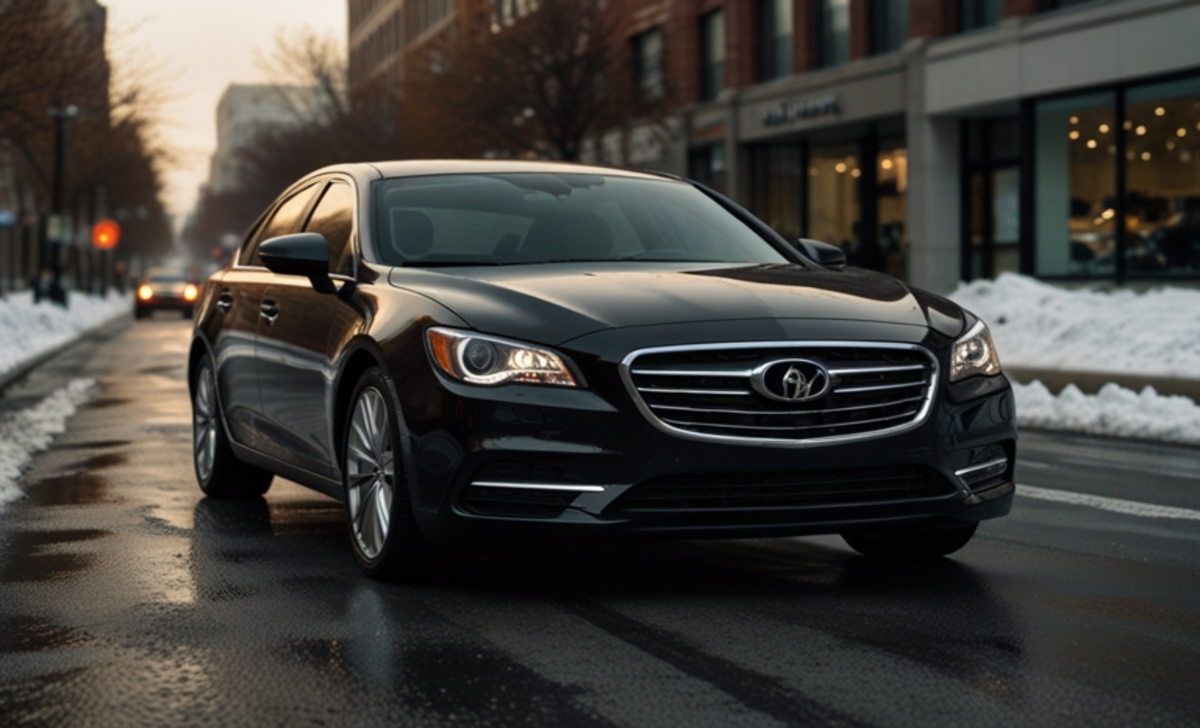
The months of November and December often provide the best deals for car shoppers. November is particularly significant due to Black Friday, a day known for substantial sales events in various industries, including auto sales. Many car dealerships offer discounted prices and promotions to entice buyers. Furthermore, December is the last month of the calendar year, when dealers aim to meet their sales goals and sales quotas.
2. Early Fall (September To October)
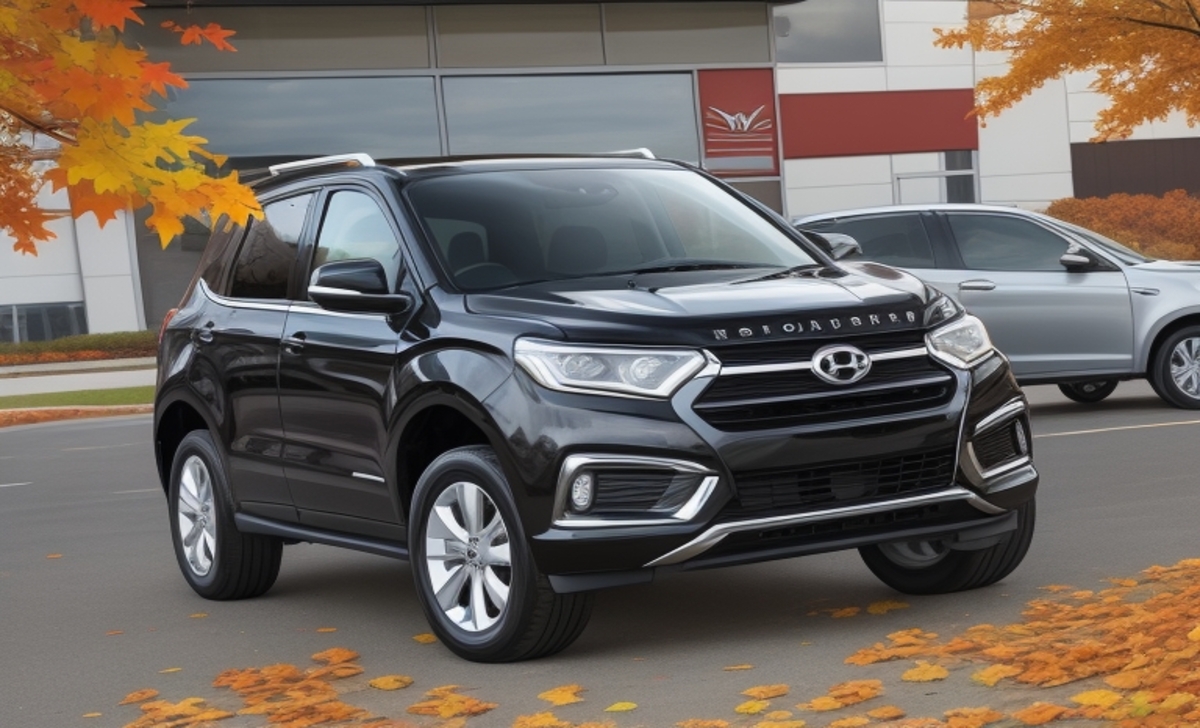
As summer ends and fall begins, dealerships clear out inventory from the previous model year to make room for new arrivals. This time of year can be advantageous for buyers, as they may find great deals on last year’s models. October often marks the launch of new vehicles, which can lead to substantial discounts on the outgoing models.
3. July 4th Sales Events
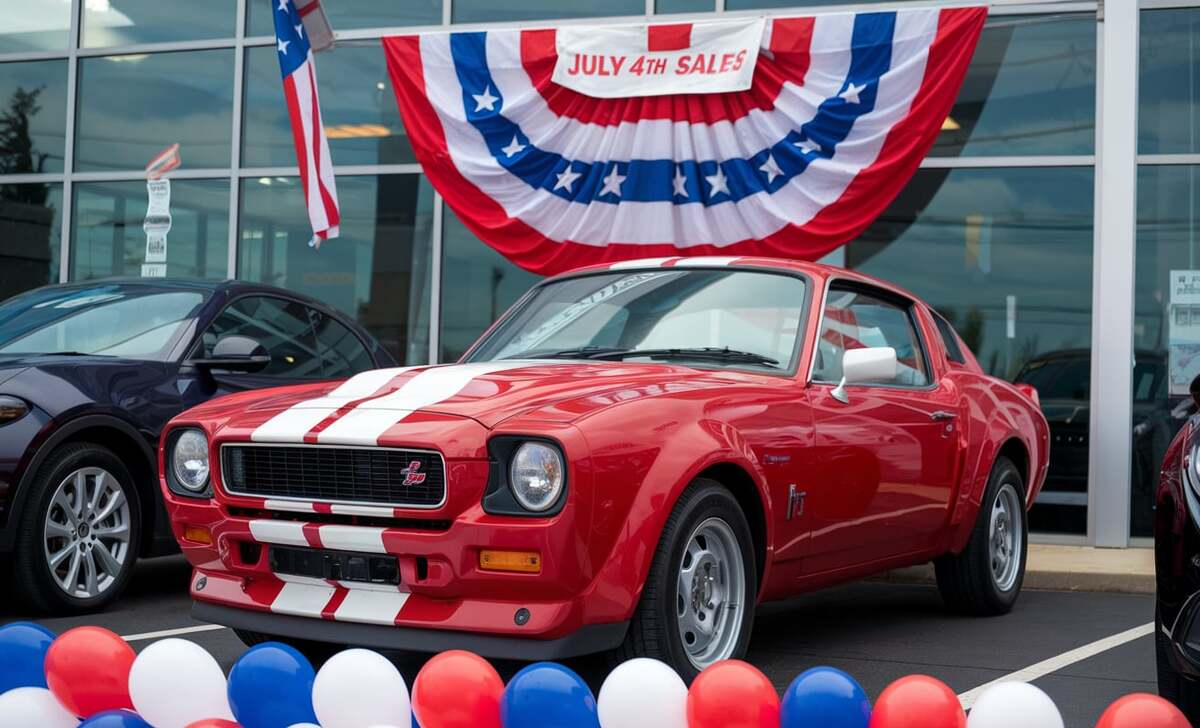
The Fourth of July is another excellent time to shop for a new car. Many dealerships celebrate the holiday weekend with promotional sales and offers. This can be a strategic time for car shoppers to secure a good deal before the busy summer sales season concludes.
Cost Discount Percentages By Month (Car Buying Trends)
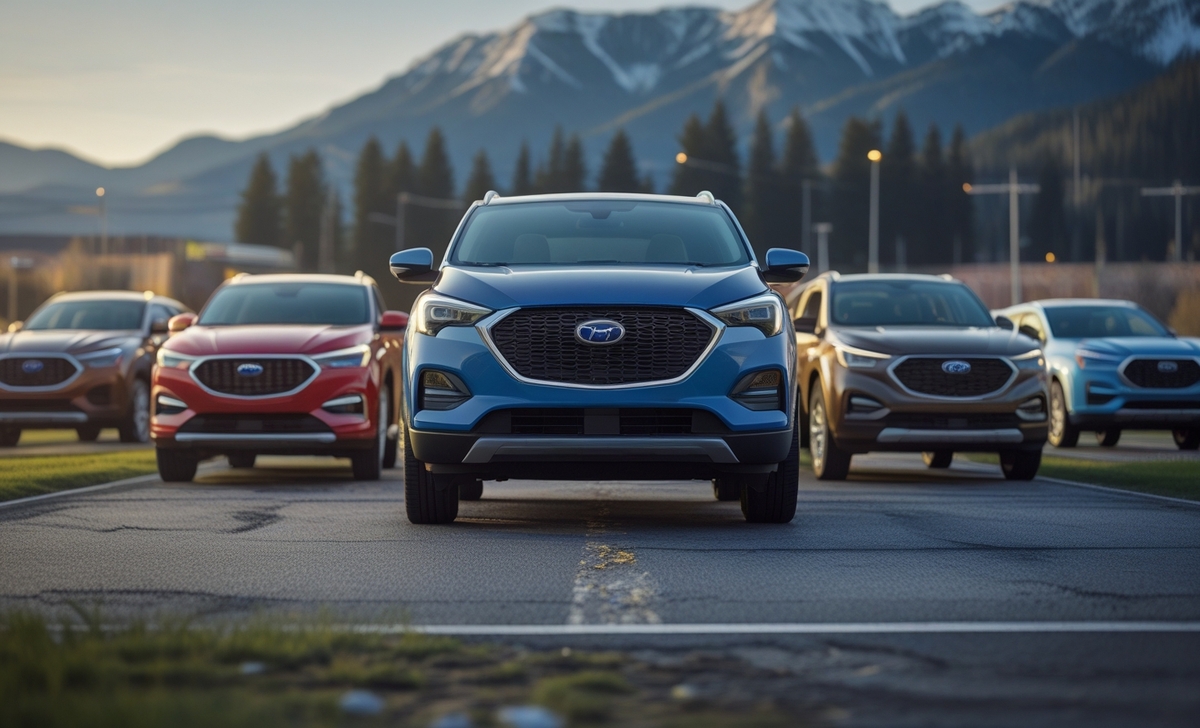
| Month | Discount Percentage (%) | Market Trend |
|---|---|---|
| January | 3.0% | Start of the year with limited incentives and reset inventories. |
| February | 3.2% | Slight improvement in discounts as dealers aim to boost sales. |
| March | 3.4% | Gradual increase in discounts with steady inventory growth. |
| April | 3.3% | Spring promotions begin, but discounts remain moderate. |
| May | 3.3% | Memorial Day sales offer competitive pricing and better trade-in values. |
| June | 3.0% | Early summer sees consistent discounts, with gradual inventory adjustments. |
| July | 2.8% | Mid-year sales push with July 4th promotions, but discounts are slightly lower than peak months. |
| August | 2.5% | Transition to new model-year cars, resulting in moderate discounts on outgoing models. |
| September | 2.0% | Model-year clearance begins, offering significant savings on outgoing inventory. |
| October | 1.5% | Peak model-year transition; dealerships prioritize clearing older models. |
| November | 2.4% | Black Friday deals boost discounts with cash incentives and special financing. |
| December | 3.1% | Year-end clearance offers the best discounts as dealers aim to meet annual sales quotas. |
- Peak Discounts: March, November, and December (up to 3.4% off MSRP).
- Lowest Discounts: October (1.5% off MSRP) during the final push for outgoing models.
- Strategic Months: Late-year sales (November-December) for maximum savings.
- Moderate Discounts: Spring and summer (March-June) offer steady but less aggressive incentives.
The Best Days To Buy A Car
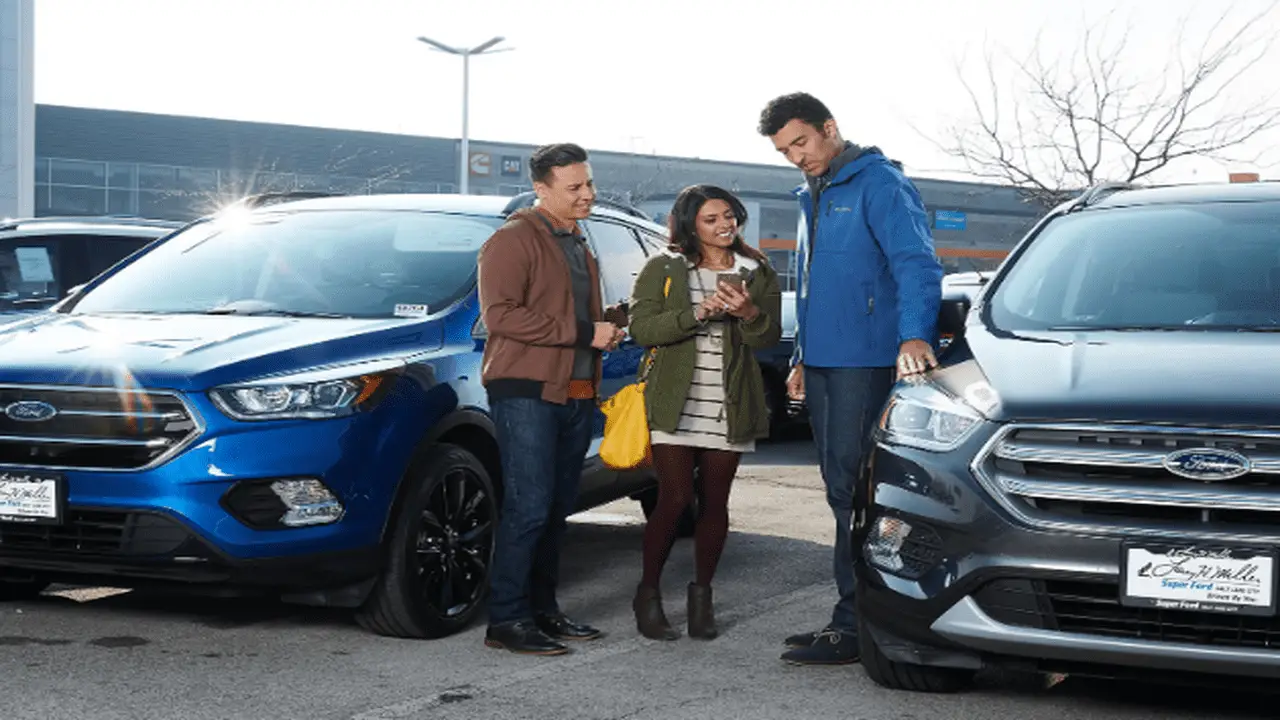
1. Mondays And Tuesdays
Shopping for a car on the best day, typically Mondays or Tuesdays, can be beneficial. These days are often less busy, allowing you to engage more effectively with a car salesperson. You can ask questions, take test drives, and negotiate prices without the stress of a crowded dealership.
2. Black Fridays
Black Friday is a unique opportunity for car buyers, as automakers and dealerships often roll out “doorbuster” deals with discounts averaging 5-10% off MSRP on outgoing models and attractive financing incentives such as low or 0% APR offers.
According to industry reports, car sales during Black Friday weekend can increase by up to 20% compared to regular weekends due to these promotions. To maximize savings,
- Prepare in advance by researching trade-in values
- Securing pre-approved financing
- Narrowing down your desired models.
This proactive approach ensures you can act quickly on the limited-time deals available.
The Worst Times To Buy A Car
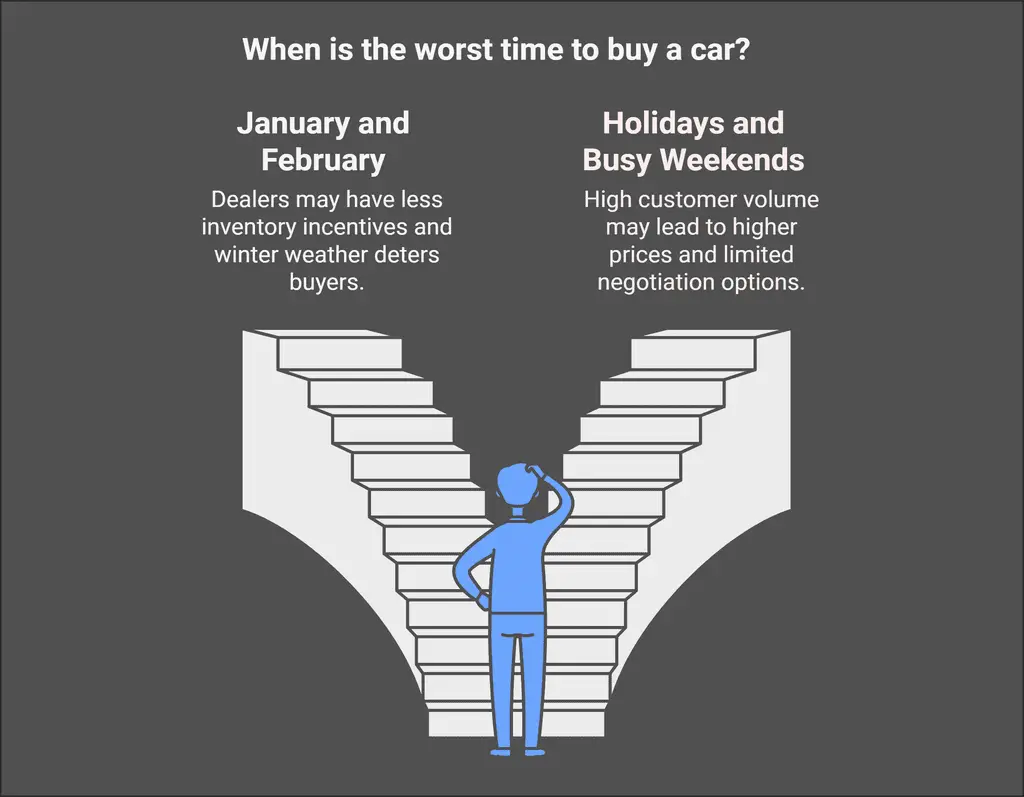
1. January And February
The beginning of the year can be the worst time to purchase a car. During these months, many dealers have just reset their inventory and may not offer the same level of incentives as during the end-of-year push. Additionally, the winter weather can deter buyers, leading to less competitive pricing.
2. Holidays And Busy Weekends
While some holidays, like Black Friday and July 4th, are ideal for car shopping, others can be less favorable. For instance, major holidays may cause dealerships to be overrun with customers, leading to less individualized attention and potentially higher prices. Shopping during holiday weekends might limit your options and the dealer’s ability to negotiate.
Strategic Considerations For Car Buyers
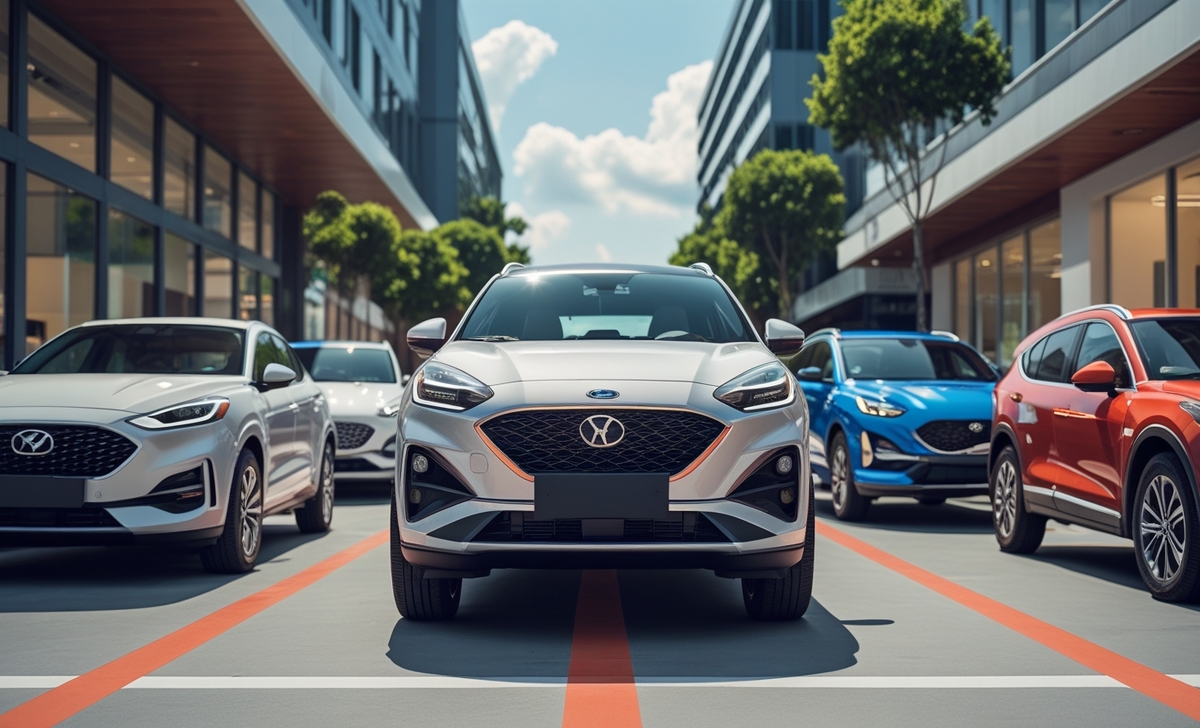
Seasonal trends offer clear opportunities for savings. However, the best time to buy depends on your priorities. Are you looking for the newest features, the biggest discounts, or a specific model? By understanding the rhythm of the auto market, you can position yourself to make a smart purchase.
- Pre-Approved Financing: Securing a car loan or auto loan can strengthen your negotiating position before heading to the dealership. Having pre-approved financing helps you understand your budget and makes it easier to compare offers.
- Understanding Discounts and Incentives: Stay informed about manufacturer incentives and rebates. These promotions can significantly reduce car purchase costs, especially for new vehicles.
- Research Before You Buy: Use online resources to compare prices and inventory at car dealerships. Knowing the discounted price of various models can empower you during negotiations.
Conclusion
Timing your car purchase can significantly impact the overall price you pay. By strategically planning your car shopping around key months and days, you can secure a better deal on your new vehicle. Whether it’s taking advantage of holiday sales, understanding the trends in car prices, or knowing the best time of year to visit a dealership, being informed makes you a savvy car buyer.
FAQs
1.What Is The Best Time Of Year To Buy A New Car?
The best time to buy a new car is typically between November and December, particularly around Black Friday and year-end sales events.
2.Are There Specific Days That Are Better For Purchasing A Car?
Yes, Mondays and Tuesdays are generally less busy, providing a better environment for negotiating prices with a salesperson.
3.What Month Is Considered The Worst For Buying A Car?
January and February are often seen as the worst months to purchase a car due to limited incentives and dealership inventory.
4.How Can I Ensure I Get The Best Deal On A Car?
Research prices, consider pre-approved financing, and shop during strategic times like end-of-year sales or holidays to find the best deals.
5.Should I Wait For A Holiday Sale To Buy A Car?
It depends on the holiday. Major holidays like Black Friday and July 4th usually have good sales, while others may be less advantageous due to crowds.
6.What Is The Cheapest Month To Buy A Car?
The cheapest month to buy a car is December, as car dealerships aim to meet their sales goals before the year ends. This month often aligns with car manufacturers’ incentives, offering great deals on both current and previous car models.
7.Which Month Is Best For Car Discounts?
November is the best month for discounts, thanks to Black Friday sales events. Late summer and early fall (September to October) also provide discounts as new car models are released, pushing dealerships to clear older inventory.
8.Which Month Is Best To Book A Car?
Book a car in early fall (September-October) to secure a great deal on outgoing car models, or during key sales holidays like July 4th for holiday-specific discounts. Timing purchases with seasonal trends ensures better prices and more favourable terms for car loans and car insurance.